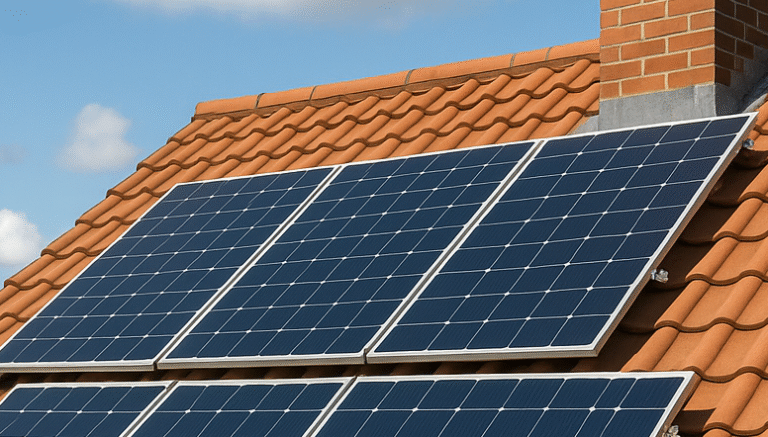New Smart Home Integrations with Solar Panels: What UK Homeowners Should Know
Can solar panels really power a smart home? And how do all these new gadgets actually work together?
Table of Contents
- 5. How Much Can Smart Home Solar Systems Save UK Households?
- 6. Can Existing Solar Panel Systems Be Upgraded for Smart Home Integration?
- 7. What Should UK Homeowners Consider Before Upgrading to Smart Solar?
- 8. The Best Option for Your Home: Bifacial or Monofacial?
- 9. Bottom Line: Why Smart Homes and Solar Are a Perfect Match
- 10. Final Thoughts
When people think about smart homes, they most likely imagine a home that quietly looks after itself. You might picture a house that wakes you up with your favourite songs, with smart appliances like a fridge that tells you when you’re running low on milk. But smart homes look more like heating that adjusts before you feel cold, your EV charges when the grid is cheapest, and your solar panels decide when to store power and when to sell it, all while you’re asleep.
That’s the promise of the modern smart home, and it’s no longer a futuristic dream. Thanks to new tech integrations, homeowners across the UK are blending home solar panels with smart devices, turning ordinary houses into energy-savvy ecosystems.
For years, solar panels worked on a simple principle: sunlight in, electricity out, but now, they can do so much more. Linked with smart meters, batteries, and connected appliances, home solar panels in the UK are becoming intelligent energy managers. They don’t just power your home; they learn from your patterns and optimise how that power gets used, stored, or shared.
In this guide, we’ll explore how household solar panels are teaming up with smart home technology, what that means for your comfort, savings, and sustainability, and how to make sure your setup is ready for the next big leap in home energy innovation.
TL;DR (Summary)
Smart home tech is giving solar panels a serious upgrade. When your system’s linked with a home battery, a smart meter, and a few connected devices, it can do much more than just generate electricity. It learns how and when your household uses energy, stores what you don’t need right away, and taps into that reserve when prices spike or the grid’s under strain. You end up using less from the grid, paying less for power, and running your home more efficiently without really having to think about it.
And with certified installers and reliable smart systems now easy to find across the UK, this kind of setup isn’t futuristic anymore. It’s just smart, modern living greener, cheaper, and built for the long haul.
What Is a Smart Solar Home and How Does It Work?
A smart solar home is a dream come true for any eco-conscious soul, it’s designed to bring together all the tools and aspects of energy saving in one space. We’re talking home solar panels, battery storage and everything in between. If it’s meant to help you use your household energy efficiently it’s most likey included in a smart home.
Here’s the simple version: during daylight hours, your solar panels generate power to run your household. Whatever you don’t use gets stored in a battery, ready to kick in at night or during peak hours.
Smart technology takes that setup and adds brains to it. It decides automatically when to use stored energy, when to tap into the grid, and when to charge your EV or run the dishwasher for the best efficiency. You can check everything live from an app on your phone, from how much energy you’re producing to how much you’re saving.
The result? A home that quietly manages itself cleaner, smarter, and far less dependent on traditional energy systems.
What Smart Devices Can Integrate with Solar Panels?
Smart homes and solar power are a perfect match. As more households switch to solar panels for home energy, the next step is connecting them with devices that make everyday living simpler and more efficient.
Here’s a list of our favourite devices:
Smart thermostats
Tools like Hive, Nest, and Tado can sync with your solar generation, adjusting heating and cooling based on sunlight and available energy.
EV chargers
Smart chargers use surplus solar energy to fill your car’s battery, ensuring every drive is powered by clean electricity.
Smart plugs and lighting
Schedule high-consumption devices (like washing machines) to run when your home solar panels are most productive.
Home assistants
Devices like Alexa or Google Home now link with solar monitoring apps, so you can literally ask your home how much energy it’s producing.
Energy-management hubs
These central systems connect everything, from panels to plugs, allowing you to see and control your home’s full energy flow.
Reminder:
Smart homes don’t just look modern; they behave intelligently. Every bit of automation adds up to less waste, lower costs, and more efficient living.
How Do Smart Meters and Solar Panels Work Together?
Smart meters are the backbone of any connected solar setup. They measure how much electricity your household solar panels generate, how much you use, and how much you export to the grid.
In a sense, your smart meter is the translator between your home and the grid. It tells your energy provider how much power you’re giving back, which is crucial for payments through the Smart Export Guarantee (SEG)
But beyond billing, the real benefit lies in insights. With a smart meter, you can:
- See exactly when your home uses the most energy
- Adjust habits to make better use of solar production
- Identify appliances that drain power unnecessarily
How Much Can Smart Home Solar Systems Save UK Households?
Let’s talk numbers, and some pretty exciting ones at that. The amount you save with smart solar depends on your setup, your daily routine, and what you’re paying for electricity. But when home solar panels work hand in hand with smart tech, the results can be impressive
- A standard 4 kW system saves around £400–£600 annually.
- Add a smart battery and automation, and that can rise to £800–£1,000 a year.
- Pair with a smart EV charger, and your car’s running costs could drop to pennies per mile.
The real MVP of this team is automation. Your system learns how your household ticks, when you’re home, cooking, charging, or relaxing, and quietly adjusts to make the most of your solar power. It’s like having a money-saving assistant who knows your habits better than you do, working in the background while you get on with life.
Ready to go Solar ?
Can Existing Solar Panel Systems Be Upgraded for Smart Home Integration?
Yes, and it’s easier than you might think. If you already have solar panels for home use, you can often retrofit smart components. That includes:
- Smart inverters: which connect your panels to Wi-Fi and provide real-time performance data.
- Battery systems: which can be added later to store excess energy.
- Monitoring apps: which track energy production and consumption.
Older systems might just need a new inverter or hub to integrate fully, but most homes can upgrade without replacing panels.
Fnal tip:
Ask your solar panel installers about compatibility, or request an inspection to see what’s possible.
What Should UK Homeowners Consider Before Upgrading to Smart Solar?
Upgrading to a smart solar setup can feel exciting and a little overwhelming. Before you dive in, it helps to pause and think it through a bit. Here’s a quick checklist we’ve put together for you:
- Connectivity: Smart integrations rely on strong Wi-Fi or hub connections. Make sure your signal reaches the inverter or battery location.
- Compatibility: Not all devices “speak” the same language. Your installer can confirm which brands and models pair best.
- Budget and ROI: While automation adds upfront cost, it pays off through higher efficiency and reduced grid use.
- Warranty: Always check that your upgrades don’t void your existing solar warranty.
- Installer expertise: Choose professionals experienced in both solar and smart home tech.
Ready to go Solar ?
How Do You Choose the Right Installer for Smart Solar Systems?
Smart integrations require more than standard installation; they need to be done by someone who understands both the electrical and digital sides of your setup. You also need to work with installers who are trustworthy and reliable in the long run should you have any questions or need further clarification.
Here’s what to look for in solar panel installers:
- MCS certification: proves compliance with UK standards.
- Experience in smart systems: especially with inverters, batteries, and automation.
- Transparent design process: they should show how the system will work in your specific home.
- Ongoing support: software updates and performance monitoring matter just as much as the panels themselves.
Partnering with Solar4Good means having a stress-free experience and process because we handle every little detail from design and installation to integration and aftercare, so homeowners can enjoy the benefits of modern solar without the technical hassle.
Bottom Line:
Smart home technology and solar panel installation are like two puzzle pieces that finally fit. One generates clean energy; the other helps you use it intelligently. Together, they give homeowners something rare: control. Control over bills, energy independence, and environmental impact. If you’ve been waiting for the right time to go solar, it’s now. The technology has matured, the government incentives are in place, and the benefits are too good to ignore.
Final Thoughts
A smart solar home isn’t science fiction; it’s the next natural step in how we live. With home solar panels and intelligent systems working in sync, you’re not just powering your house; you’re shaping the future of sustainable living.
At Solar4Good, we make that transition simple. From consultation to installation and integration, our experts handle every detail, so your home runs smarter, cleaner, and cheaper. Ready to connect your home to the future? Contact us today for an obligation-free consultation.
FAQs
Yes. Most modern systems come with mobile apps that let you track production, storage, and savings in real time.
If you have a battery with backup capability, your home can continue running essential appliances even when the grid is down.
Usually yes. Adding a compatible inverter or hub allows older systems to connect with modern smart tools.
No, they make it easier. Real-time monitoring helps identify issues early, often before you notice them.
Not necessarily. Costs depend on the number of devices and battery size, but most UK homeowners see a return on investment within a few years.

About the author -
Manan Shah
Leader without Title, Solar4Good
London, United Kingdom
Manan helps homeowners and businesses understand solar with clear, honest advice rooted in real-world experience. He has led national solar education seminars and spoken at major events including Everything Electric Show and The Care Show.

